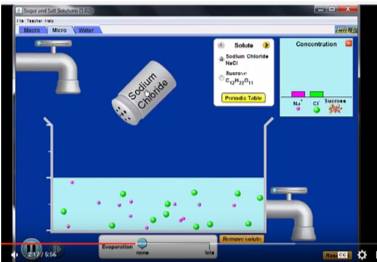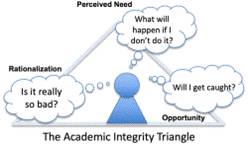Deborah Herrington
[1728085717].jpg)
Director, CLAS Center for Experiential Learning
Professor of Chemistry and Integrated Science Program
Office: MAK B-3-226
Phone: (616) 331-3809
Email: [email protected]
Education/Professional Training
B.Sc. Honours Chemistry, Wilfrid Laurier University
M.Sc. Chemistry, University of Waterloo
B.Ed. Secondary Science and Mathematics, Brock University
Ph.D. Chemistry - Education Emphasis, Purdue University
Current research
Developing and Testing a Framework to Evaluate the Quality of Chemistry Instructional Videos Students are Watching on YouTube
This is an NSF funded project (DUE- 2314955 and 2314956) in collaboration with Dr. Ryan Sweeder at MSU. We are working alongside several undergraduate students to:
- Develop and test an evidence-based framework for evaluating the instructional quality of the most frequently watched chemistry concept videos on YouTube.
- Use the framework to evaluate chemistry YouTube videos covering a variety of topics.
Specific research questions guiding our work include:
- How well do the most watched chemistry videos for core introductory chemistry concepts incorporate features that support conceptual understanding?
- How well do the most watched chemistry videos for core introductory chemistry concepts incorporate the features of quality instructional videos?
- What quality criteria are most frequently incorporated into or missing from the most highly viewed videos?
- How frequently are videos that meet most/all the criteria for high-quality instruction viewed?
To date we have looked at Le Chatelier’s Principle, Chemical Bonding, and Intermolecular Forces and worked with 10 undergraduate students (Leah Zajac, Sophia Gudinas, Kayla Dramer, Ishu Kudapa, Chloe Lohman, Lucian Forestieri, Sylvie Schrader, Alen Pope, Ana Ivanov, and Victoria Chisholm). We are always looking for more undergraduate students interested in working with us. If that is you, please contact Dr. Deborah Herrington ([email protected])
Publications and Presentations from this work thus far:
American Chemical Society 2024 Fall National Meeting, Denver, CO, August 18-22, 2024. What do Students Find when Searching Core Chemistry Concepts on YouTube? (Poster: Herrington, D. & Sweeder, R.)
Biennial Conference on Chemical Education, Lexington, KY, July 28-Aug. 1, 2024. Chemistry Concepts on YouTube: How Well do Educational Videos Support Conceptual Learning of Intermolecular Forces? (Gudinas, S., Zajac, L., Sweeder, R. & Herrington, D.)
American Chemical Society 2024 Spring National Meeting, New Orleans, LA, Mar. 17-21, 2024. How do we help our students access quality chemistry instructional videos? (Talk: Sweeder, R. & Herrington, D.)
American Chemical Society 2024 Spring National Meeting, New Orleans, LA March 17-21, 2024. Bonding with YouTube! What Can Students Learn about Covalent and Ionic Bonding? (Poster: Zajac, L., Sweeder, R. & Herrington, D.)
Gordon Research Conference: Chemistry Education Research and Practice, Bates College, Lewiston, ME, July 9-14, 2023. Are YouTube Chemistry Videos Supporting Your Students? (Poster: Sweeder, R., Zajac, L. & Herrington, D.)
2023 LBC Research Symposium, Michigan State University, East Lansing, MI, April 2023. Education Videos: How Can Students Search Smarter? (Poster: Zajac, L., Sweeder, R. & Herrington, D.)
Using Text-messaging for Student Self-Assessment and Formative Assessment

We have developed and tested a formative/self-assessment system that combines a free text-messaging app with Google Forms. Assessment items are developed using the 3-dimensional (3D) framework for teaching and learning of science. Potential Student Projects: Developing 3D assessment items. Using quantitative and qualitative educational research methods to evaluate the impact of formative/self-assessment on student performance and confidence. Refinement of the text-message/google forms system to better integrate the two. Interested? Contact Dr. Herrington ([email protected])
Publications and Presentations from this work thus far:
Sweeder, R.D. & Herrington, D.G. (2020 Editor’s Choice). Formative assessments using text messages to develop students’ ability to provide causal reasoning in general chemistry. Canadian Journal of Chemistry. 98(1), 15-23. doi: 10.1139/cjc-2019-0291
Herrington, D.G. & Sweeder, R.D. (2018). Using Text Messages to Encourage Meaningful Self-Assessment Outside of the Classroom. Journal of Chemical Education, 95(12), 2148-2154. doi: 10.1021/acs.jchemed.8b00361
American Chemical Society Great Lakes Regional Meeting, Lisle, IL, May 1-4, 2019. Meeting our students where they are: Using text messaging to support students learning and formative assessment in introductory chemistry. (Invited talk: Herrington, D. & Sweeder, R.)
25th IUPAC International Conference on Chemistry Education, Sydney, Australia July 10-14, 2018. Meeting our students where they are: Using text messaging to promote effective studying and provide formative assessment in introductory chemistry. (Invited talk: Herrington, D., Sweeder, R., & P. Daubenmire)
Past research
ChemSims: Facilitating Online-learning in Chemistry Using Simulations
Dr. Herrington and Dr. VandenPlas jointly oversee a research project in collaboration with Dr. Ryan Sweeder at MSU that develops simulation and screencast assignments to help students better understand key chemistry concepts and looks at how students are using the screencasts vs. simulations, what students like and dislike about the different types of assignments, and how the use of screencasts or simulations affect students' understanding of key concepts. We collect quantitative and qualitative data from students as they use the assignments and use eye-tracking interviews with students to explore how they are using the screencasts and simulations. More information can be found at our website.
Potential Student Projects: Developing and testing screencasts that incorporate particulate level chemistry simulations. Studying how students use these screencasts as compared to how they use the actual simulations. NSF funded.

Analyzing Postings from the Strategies for Teaching Chemistry Online Facebook site
A collaboration with Dr. Brittland DeKorver and undergraduate students Ariel Chaney and Mitchell Krahulik looking at the development of an online learning community and how different instructors viewed assessment and academic integrity during the COVID pandemic.

Publications and Presentations from this work:
DeKorver, B.K & Herrington, D.G. (2023). Strategies for teaching chemistry online: A community of educators for the COVID-19 pandemic and beyond. In J.Y. Dori, C. Ngai, G. Szteinberg (Eds.) Digital Learning and Teaching in Chemistry: An International and Inclusive Approach. (pp. 411-425). Cambridge, UK: Royal Society of Chemistry. doi.org/10.1039/9781839167942
DeKorver, B.K., Krahulik, M., & Herrington, D.G. (2023). Differences in chemistry instructor views of assessment and academic integrity as highlighted by the COVID pandemic. Journal of Chemical Education. 100(1), 91-101. doi.org/10.1021/acs.jchemed.2c00206
DeKorver, B., Chaney, A., & Herrington D. (2020). Strategies for teaching chemistry online: A content analysis of a chemistry instruction online learning community during the time of COVID-19. Journal of Chemical Education. 97(9), 2825-2833. doi:10.1021/acs.jchemed.0c00783
Biennial Conference on Chemical Education, West Lafayette, IN, July 31-Aug. 4, 2022. Help, I’ve been Chegged! Understanding academic integrity in the chemistry classroom. (Talk: DeKorver, B. & Herrington, D.)
Courses taught
- CHM 109: Introductory Chemistry
- CHM 115: Principles of Chemistry I
- CHM 116: Principles of Chemistry II
- CHM 201: Introduction to Chemical Sciences
- CHM 231: Introductory Organic Chemistry
- CHM 241 lab: Organic Chemistry for Life Sciences I
- CHM 242 lab: Organic Chemistry for Life Sciences II
- SCI 280: Introduction to Science Research
- SCI 319: Science in Elementary Education
- CHM 491: Chemistry Seminar II
- CHM 610/SCI 610: Graduate Research Seminar
- CHM 611/SCI611: Science Research for Teachers
- CHM 612/SCI 612: Application of Research to Teaching
- CHM 621/SCI 621: Education Research in Science
- CHM 631/SCI 631: Inquiry Curriculum Development
- CHM 632/SCI 632: Inquiry Colloquium
- CHM 633/SCI 633: Applications of Science Education
- ED 680: Special Topics in Education – Action Research
